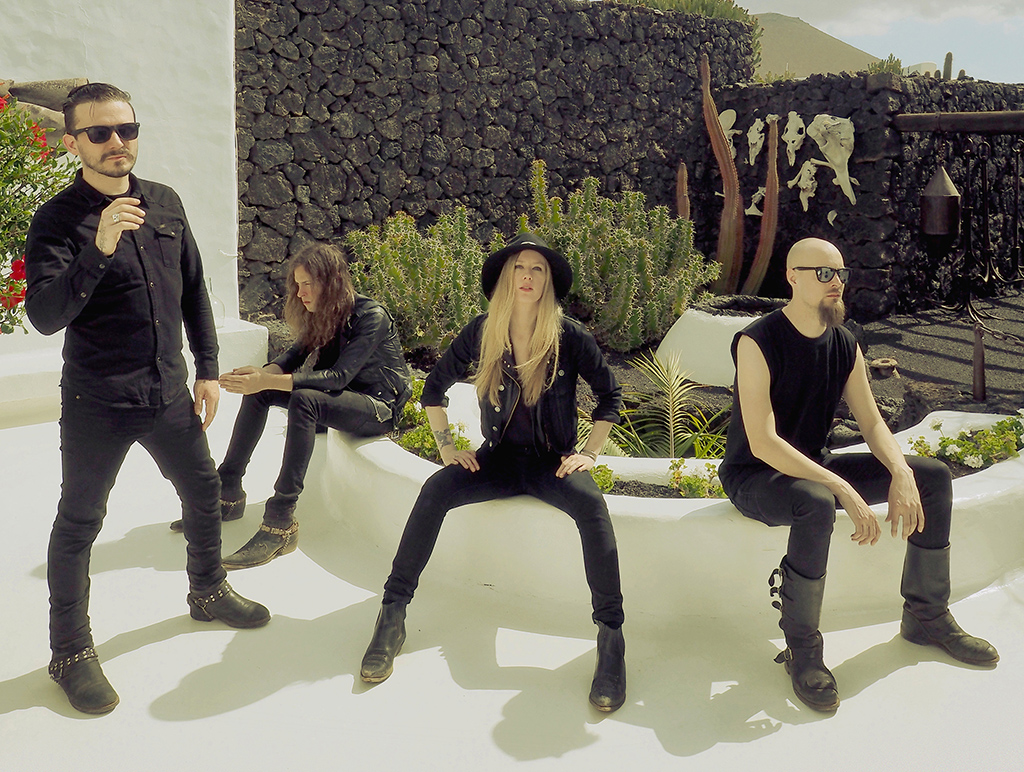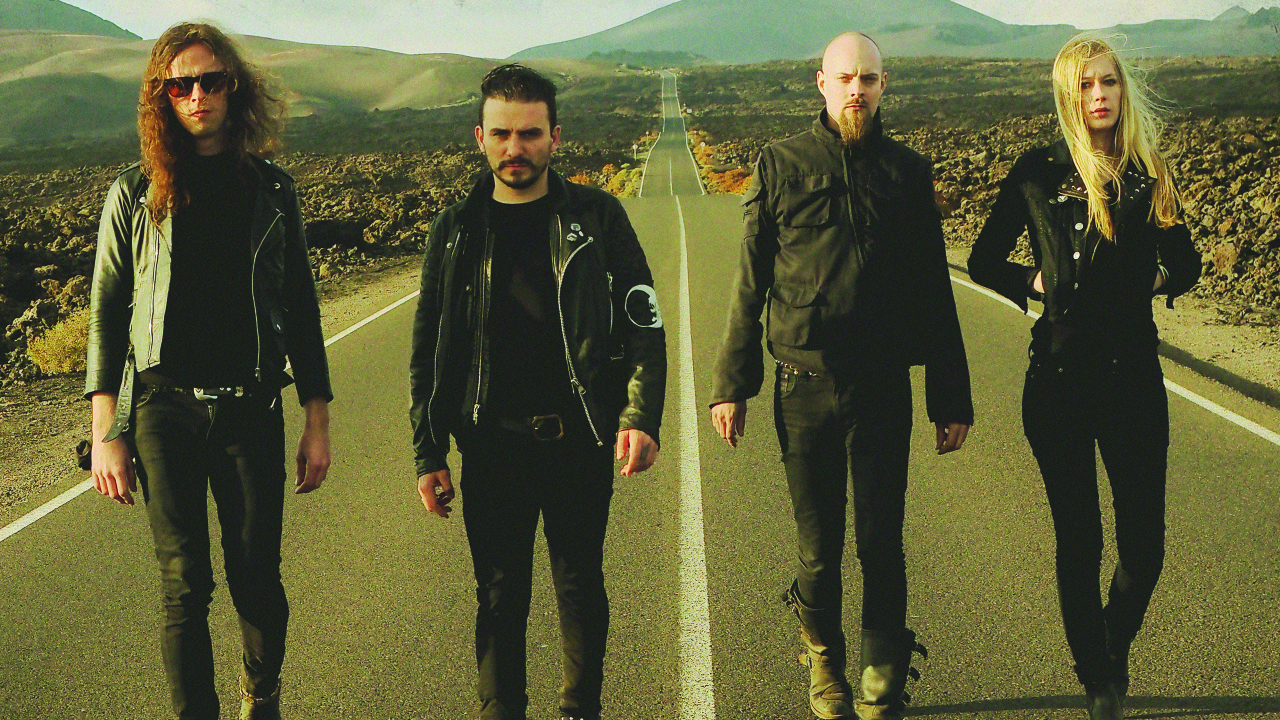As mankind edges toward any number of self-inflicted extinction-level events, we can comfort ourselves with the knowledge that as the dust settles and the smoking rubble cools, there is a strong chance that life will continue, thanks to the indestructible nature of cockroaches… and goths.
It arrived out of the blue and may, at first, seem like an unlikely phenomenon within the metal realm, but the ongoing proliferation of bands in thrall to the bleak and brooding textures and grooves of post-punk and early gothic rock is simply one of the most perversely refreshing developments in our world in recent times. Those of us old enough to remember when bands like Joy Division, The Cure and Killing Joke redefined the nature of alternative rock music were immediately drawn into this curious revival, largely due to the emergence of Beastmilk and their 2013 album Climax: a vibrant and visceral eruption of skeletal anti-funk and scabrous clangour that also seems to have captured the imagination of a generation that didn’t experience this stuff first time around. Unfortunately, just as their reputation soared and genuine mainstream success seemed a distinct possibility, Beastmilk crumbled into dust.
Oddly, there is a happy ending here. Or, at least, a happier next chapter. One lineup reshuffle and a reaffirmation of intent and values later, and this Anglo-Finnish quartet have re-emerged as Grave Pleasures, with a brand new album and a deal with Sony. The dream, as dark as it assuredly is, lives on.
“Being inside Beastmilk, it was always a downward spiral,” says vocalist Mat ‘Kvohst’ McNerney. “We were never really happy as a band. We were never really a band! We came out of nowhere and it was meant to be an anti-band, really. It was formed as a purge for all the stuff we’re miserable about. It was a symptom of what was to come, the fact that the band was doomed! The success was also the downfall of it. It quickly escalated. I don’t think it could’ve gone any other way. Climax was a good album at a good point and if people don’t like the continuation, that’s fine, but for us this feels like a fresh start. The next album would’ve been very different anyway. We can go in any direction we want now.”
It would be disingenuous to claim that the new Grave Pleasures album offers a radically different vision from the one that gripped the underground via Climax’s heady rush of abrasive desperation, but there is definitely a sense that this renamed and retooled lineup have stepped up a gear this time round. Timing is everything, and while the explosion of likeminded bands that has occurred since Beastmilk shimmied into view suggests that metal’s newfound affinity with the post-punk movement will be an enduring one, Mat and his comrades remain the only band around with the momentum to shrug off their underground status and head for bigger things, not least due to their somewhat controversial decision to sign with Sony.
“I’ve seen comments here and there, people getting a bit upset about it and imagining all sorts of things, that the cover we made for the album, the songs that we wrote or the production are as a result of pressure from Sony, but that’s ridiculous,” says Mat. “We don’t do anything we don’t want to do. The thing is, we had a lot of labels interested in Beastmilk, and then we changed the name and sat down with a few more, but Sony just said ‘yes’ to us all the time. We’re really driven and underground-minded, so we were excited to find a label that will let us do whatever we want. They’ve been really supportive and that felt far more underground than some of the independent metal labels who just said: ‘This is how we do it, and this is how it’s done…’ Major labels are always portrayed as this evil entity, but you’re on a knife-edge, whether you’re in the underground or on a major label. It can always just fall on its face. And that’s fine. That would be somehow perfect, considering our fatalistic attitude. It’d be like, ‘Yeah, thought so…’ Ha ha! That would really suit this band, I think.”

From the barrelling firestorm of opener Utopian Scream and the hellish Echo & The Bunnymen hooks of New Hip Moon to the sinister swagger of Crisis and the elegant horror of Girl In A Vortex, Dreamcrash amounts to an imperious consolidation of the musical ethos that first appeared on Climax. If there is a major difference between Grave Pleasures and their earlier incarnation, it’s that this time the tunes are bigger, but the underlying darkness is denser and more impenetrable. The act of exorcising demons has seldom sounded more vital or celebratory, but it is undeniable that these songs come from a place that offers little hope.
“I think we really connected over that misery, that shared melancholy,” Mat muses. “I think it’s the North… We’re just miserable gits. Finns have had a pretty raw deal through history. They have the same kind of mindset, that dark humour, and it feels very British somehow. Getting to know each other through the music, you get that catharsis from purging all that dark stuff. We still have that today. That’s when you feel really connected, when you share those dark times. That’s what we try to communicate through the music. Take a song like Crisis: it’s an extremely dark song but it’s really upbeat and positive too, with that dancey vibe. I think that’s quite revolutionary, the idea that dark music can make you happy. Fenriz spoke about that once, that people with privileged lives tend to listen to really dark music and people who are in dark places listen to happy music. But it’s just people in the cold North… We like to dwell in our misery!”
It’s not hard to see why Grave Pleasures’ infectious cacophony seems to be forging such a strong connection with fans from many points along the heavy music spectrum, but it still remains a quiet mystery why the plundering of post-punk tropes has become so commonplace in the second decade of the 21st century. The way Mat explains it, it seems like a hazy mixture of nostalgia for those actively involved in the music and some inexplicable aligning of the planets that has paved the way for this sound to resonate anew.
“When we started, the bands we really admired were the kind of weird, fringe cult stuff like Psychic TV and Current 93 and all the stuff that sprang from the weird parts of the 80s,” Mat notes. “I love 70s retro rock, but it’s not my era and it’s not where I’m from. So maybe it’s just our generation, missing that sound a little bit and thinking back to bands that you’ve kind of ignored but that are a big part of your life. Those 80s bands were a touchstone moment for people, where they think, ‘That was when I had my first kiss!’ or ‘That’s when I had my heart broken…’ and they were listening to The Cure at the time. It feels like that resonates a little more right now, for whatever reason. Also, with the political climate, it feels like some of those common themes are coming back, and that’s why those bands were so important back then and why it works now.”
A cynic might argue that this post-punk obsession has been lurking on the fringes of the mainstream for years now, via the indie-friendly likes of Editors, Interpol and Savages. One of several things that set Grave Pleasures firmly apart from those bands is the fact that this band all have a background in underground metal, and while Dreamcrash is hardly overburdened with blastbeats or demonic invocations, the sense that this is, at heart, a metal thing is unmistakable.
“I also think of a lot of other influences that aren’t obviously mentioned when people talk about us,” Mat agrees. “Voivod are a huge influence, for instance. It comes through different filters, but we’re basically from the metal scene, or the avant-garde metal scene, so we all have that reference and what we do will be from that heavier perspective. I still see it as metal. Bands like Editors and Interpol, they have no sense of metal in the structure or how their music is presented. I don’t think you could ever take the metal out of what we do and I don’t think you could ever forget that it’s metal musicians making this music. It’s just part of our DNA.”
And so it begins again. The spirit of goth and post-punk, reborn, rejuvenated and delivered with metallic braggadocio by some gloomy northern Europeans with the unerring collective ability to get black metal diehards dancing to songs about sex and death… Not the most obvious evolutionary step for heavy music in 2015, but one that wields an ageless allure. Grave Pleasures could be massive in 12 months’ time. Or not. Either way, the future looks brilliant and bleak in equal measures.
“Alan from Primordial said to us, ‘Your music is so sexy!’” laughs Mat. “That’s been missing in rock’n’roll for a while, that sense of sexiness. He didn’t mean he thought we were sexy, though. Ha ha! It’s just that the music itself has got that sense of sex in it. Dark songs about love and lust and death. Everyone can relate to that.”
*DREAMCRASH* IS RELEASED ON OCTOBER 2 VIA SONY/COLUMBIA

Death Disco
Three apocalyptic party anthems from the original post-punk era.
SIOUXSIE & THE BANSHEES – Spellbound
The band that first dragged punk rock into the gothic gutter, the Banshees recorded countless classics, but this sustained rush of otherworldly abandon from 1981 remains their most potent dancefloor diatribe. Siouxsie’s opening cry of, ‘From the cradle bars comes a beckoning voice/It sends you spinning, you have no choice…’ sums up post-punk’s intoxicating potential beautifully.
BAUHAUS – Kick In The Eye
Underpinned by a scabby-knuckled funk bassline and a lobotomised disco beat, gothic rock legends Bauhaus were transcending genre boundaries at will when they released this syncopated howl of cerebral malpractice in 1981. More than three decades later, the band’s influence can be heard throughout the metal underground.
KILLING JOKE – Kings & Queens
Although overshadowed by Love Like Blood, another track from 1985’s Night Time album and Killing Joke’s biggest chart hit, Kings And Queens’ irresistible momentum and skewed, mutant funk underbelly made it one of the post-punk icons’ most powerful rebel hoedowns. Lost in life’s claustrophobic shadows, Jaz Coleman demands that we let loose. So we do.

